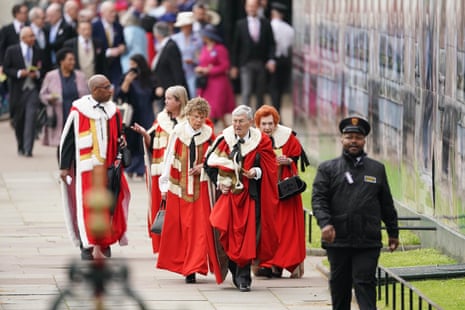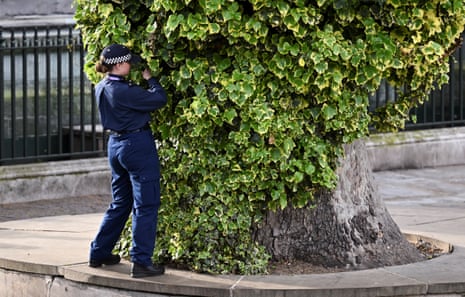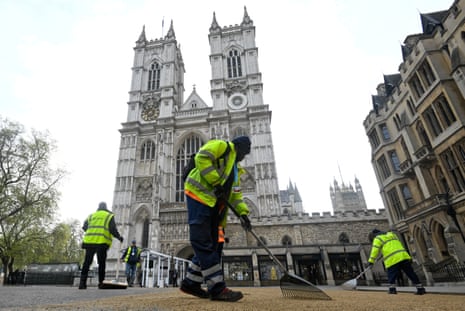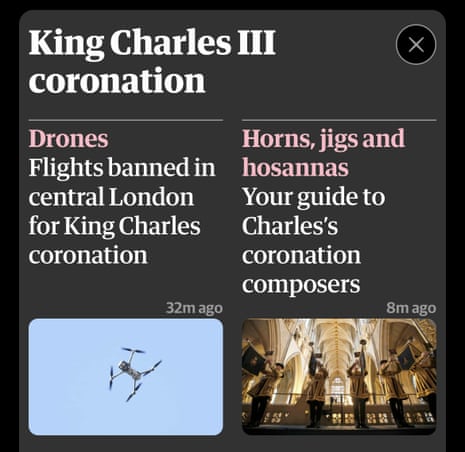What to expect: key events and timings

Jamie Grierson
Saturday 6 May
6am BST: Viewing areas open along the 1.3-mile procession route from Buckingham Palace to Westminster Abbey.
7.15-8.30am: Guests for Westminster Abbey begin to arrive.
9am: Congregation to be seated inside the abbey.
9.30-10.45am: Heads of state, overseas government representatives, government ministers, first ministers, former prime ministers, foreign royals and members of the royal family arrive.
9.45am: The Sovereign’s Escort of the Household Cavalry begin to gather for the procession from Buckingham Palace.
10.20am: The king and queen consort’s procession sets off from the palace.
10.53am: The king and queen consort arrive at Westminster Abbey.
11am: They enter the Abbey through the great west door and the service begins.
12pm: The king is crowned. The archbishop of Canterbury places the St Edward’s crown on his head. Trumpets will sound and gun salutes will be fired across the UK.
1pm: The service ends and the newly crowned king and queen begin their coronation procession back to Buckingham Palace in the gold state coach.
1.33pm: The king and queen consort enter Buckingham Palace through the Centre Arch.
1.45pm: The king and queen receive a royal salute from the military in the palace gardens
Approximately 2.15pm: The king, queen and members of the royal family appear on the palace balcony to watch the flypast – weather permitting.
Sunday 7 May
The monarchy wants Sunday to be a day of street parties and coronation “Big Lunches”, with about 3,000 road closures for parties, and members of the royal family attending some events.
At 7pm BST there will be a concert in the grounds of Windsor Castle. The event will be watched by a crowd of 20,000 members of the public and invited guests and broadcast on television and radio.
Key events Show key events only Please turn on JavaScript to use this feature
Divisive people's oath reportedly 'toned down' after criticism
In a break with tradition, for the first time at a coronation, people are being asked to swear their allegiance to the king in public as part of the ceremony, although the format has been tweaked slightly from what was first announced.
PA’s court correspondent Tony Jones reports that Charles reportedly approved the change which came after a string of commentators criticised the new addition as divisive.
The archbishop of Canterbury, Justin Welby, will now “invite” a show of support from the congregation rather than a “call” to those in the Abbey and elsewhere to swear allegiance to the King.
On Friday it had seemed like Charles might be trying to distance himself from this innovation, with his friend Jonathan Dimbleby telling BBC radio that the new king finds the idea of people paying homage to him “abhorrent”.
Dimbleby said “I don’t know for certain but it would seem to me that this was an initiative by the archbishop who, as we know, is strongly evangelical, who thought it would be a good thing to give everyone a chance to pay that homage. I think it was well-intentioned and rather ill-advised.”
Following Dimbleby’s comments, Lambeth Palace, archbishop’s Justin Welby’s office, repeated its insistence that all elements in the coronation service were drawn up in close consultation with Buckingham Palace. It would not be the first time that a monarch in England has complained about a turbulent priest.
The declaration was intended to replace the homage of peers, which is quite a strange part of the ceremony in itself. Formerly hereditary peers knelt to pay homage to the monarch, before touching the crown and kissing his or her right cheek.
We asked Guardian readers earlier this week what they thought about the new people’s oath though, and … well …
Read more here: ‘You must be joking’: readers on swearing oath of allegiance on King Charles’s coronation
The first guests have begun to arrive and start taking their places at Westminster Abbey. Given that it isn’t even 8am yet in London, and the service doesn’t start until 11am, that is quite a lot of small talk to make.


Archbishop of Canterbury: coronation will be celebration of 'all our wonderful diversity'
The archbishop of Canterbury Justin Welby has said that today’s coronation serves as “a powerful reflection and celebration of who we are today, in all our wonderful diversity”.
“The Coronation of King Charles III and Queen Camilla promises to be a beautiful, joyful and historic occasion,” the archbishop said.
“People can certainly expect to be struck by the majesty and sacred wonder of the service, but also to be invited to pause and reflect.
“To reflect on our past, our future and, as we pray for our new sovereign, on our own lives and how we too are called to serve others.
“This service reaches deep into our nation’s Christian history. From the ancient and sacred act of anointing monarchs, to the use of the sixth-century St Augustine Gospels, the service will link us in a profound way with our national story”.
The archbishop added: “But this is not simply history: I hope the service offers people an opportunity to hear the living words of God, which bring good news to every person in every generation.
“I also hope and pray that the coronation will serve as a powerful reflection and celebration of who we are today, in all our wonderful diversity.
“So I will be praying that everyone who shares in this service – in the Abbey, across the country and beyond – will find ancient wisdom and new hope.
“I pray that it inspires us all, like the King and Queen, to live our lives in service to others.”
Since Henry VIII’s schism with Rome, the coronation has either been seen as a forceful assertion of the Protestant faith of the monarch, or a reassertion of Catholicism in the realm.
PA notes that representatives from other faith communities will play an active role in the coronation of a British sovereign for what is said to be the first time.
When the regalia is presented to Charles – Sikh, Hindu, Muslim and Jewish peers will take part, handing over items which do not have Christian meaning or symbolism.
Here are some pictures of the last-minute preparatory work that has been carried out this morning to get the coronation show on the road.



I know, I know. There is a significant chunk of Guardian readers who tell us that we should do less coverage of the monarchy. In defence of this live blog, our stats tell us that the royal coverage we do produce is always deeply read both at scale and at length.
But as a reminder, in our apps and on our website you can always hide any of the containers on the front, so if you do want to have a coronation-free Guardian experience today, just hit the “Hide” button on the front page.

In the app, you are looking for the big ‘X’.

I presume, given that you must have clicked or tapped on the live blog to get here, that I am preaching to the converted, but I thought I should make it clear that the option is there.
As an alternative, you could try this: Māori artist’s web plugin replaces king’s coronation with Indigenous news

Alexandra Topping
My colleague Alexandra Topping is out and about with the crowds in central London early this morning:
Crazy scenes around the streets of the coronation route London this morning, which have been heaving since the very early hours as people hope to secure a good spot.
People have been jostling for position, and begging with very stressed looking security personnel to let them in certain areas in the hope that they will get a decent view of King Charles and Camilla.
“We didn’t get coffee,” says Anne Nieto, who with her husband John has travelled from Calgary in Canada to be at today’s festivities. “We didn’t even have time for a cup of tea before we left the hotel.”
Is it worth it? “Of course,” she says with an air of surprise. “It doesn’t happen very often does it and we just want to be part of it.”
Husband John roots around in their bag and pulls out one of their emergency supplies: a small flask of rum. “We’re waiting until 10,” he says. Anne adds: “Maybe. It’s 5 o’clock somewhere isn’t it.”
On the Mall for the #Coronation. John and Anne Nieto have travelled from Calgary in Canada. They are currently deeply regretting not getting some coffee before getting their spot at 5am, but have a hip flask of rum for emergencies pic.twitter.com/vwvrNOPpUb
— Alexandra Topping (@LexyTopping) May 6, 2023The official account of the Prince and Princess of Wales has tweeted out a promotional video clip for today’s coronation, saying “Today’s the day”.
My colleague Daniel Boffey is out at Trafalgar Square in central London where a small group of anti-monarchy protesters is already present.
Radical Hasland, 29, real name apparently, one of 20 or so anti monarchist protestors down at Trafalgar Square. Says they will stick together as ‘we are heavily outnumbered’. pic.twitter.com/rOleyksQLc
— Daniel Boffey (@danielboffey) May 6, 2023No formal role in ceremony for Prince Harry or Prince Andrew
The Duke of Sussex and the Duke of York will not have any formal role at the coronation, Buckingham Palace has confirmed.
PA reports Harry and Andrew, who are no longer working royals, will attend the service on Saturday, but will not perform any duties.
The two men will also be absent from the procession behind the gold state coach carrying the newly crowned king and queen from Westminster Abbey back to Buckingham Palace after the ceremony.
Andrew stepped down from public life after his disastrous Newsnight interview in November 2019 and the furore over his friendship with convicted paedophile financier Jeffrey Epstein.
The late queen’s disgraced second son went on to pay millions to settle a civil sexual assault case to a woman he claimed never to have met.
Ahead of his legal settlement, his mother, Queen Elizabeth II stripped him of all of his honorary military roles, including colonel of the Grenadier Guards, and he gave up his HRH style.
There was vocal criticism of Andrew’s very public role during his mother’s funeral last year. Mariann Wang, who represented more than a dozen Epstein survivors, said it was “beyond shameful to see Andrew being granted any form of state-sponsored honor or privilege, given his past affiliation with Jeffrey Epstein”.
A 22-year-old was arrested in Scotland and charged with breach of the peace after the Duke of York was allegedly heckled as he walked behind the queen’s coffin.
You may have noticed recently that we have been testing a new way for readers to message live bloggers directly. You should – on mobile web or desktop at least, it hasn’t been rolled out in our app – find an option to message me near to my byline. These aren’t public comments, they go directly to me. I will try and read everything, but I can’t guarantee I will reply, although hopefully it will improve the blog for everybody.
What sort of messages are useful? I am going to be typing a lot today, and at speed. So for a start if you spot my inevitable typos, or notice that I’ve mistaken the Earl of Devesham for Sir Cheldon Bonniface in a picture caption, or you think I’ve got some aspect of the ceremony wrong, that is very useful to know. I’m also keen to hear from you if you think there is something I’ve missed in our coverage, or something you don’t understand and would like more context for.
What is less useful? The comments are just going to me. If you want to let the Guardian know how you feel about the very existence of the monarchy, and our coverage of the coronation in general, can I gently direct you to guardian.letters@guardian.co.uk instead?
What will happen in Westminster Abbey today – order of service
Overnight Westminster Abbey and Buckingham Palace have made available the order of service. It contains a long preamble about the history of the occasion, and then details of the music to be used in the ceremony, as well as a list of who is who in the procession.
Guests attending will include members of the royal family, as well as international representatives from 203 countries, including approximately 100 heads of state, alongside community and charity champions.
You can view it in full here, but here is an edited part of the preamble.
Bible passages will be read; the archbishop will preach a short sermon; hymns will be sung; and bread and wine will be offered, consecrated, and received by the king and queen.
Early in the service His Majesty the king turns to each of the four points of the compass and is recognised by his peoples as their “undoubted king”.
A Bible is presented to the king, upon which he swears oaths to govern the peoples with justice and mercy and uphold the churches. Then, for the first time at a coronation, the king prays publicly for grace to be ‘a blessing to all … of every faith and belief’ and to serve after the pattern of christ.
After the sermon, the ancient hymn Veni, Creator Spiritus is sung in languages from across the UK, calling on the Holy Spirit just before the most sacred part of the coronation rite – the anointing with holy oil. A screen shields the king from view as he sits in the coronation chair for this most solemn and personal of moments.
Once anointed, the king is vested in priestly garments that symbolise both humility (the Colobium Sindonis) and splendour (the Supertunica, Stole, and Robe). Various items of regalia are presented to the king, each a visible reminder of his great responsibility under God.
There are spurs and armills, which would have been worn by a medieval knight, and a sword which the king first wears and then offers in the service of God. Then come the symbols of secular and spiritual power: an orb, representing the world under Christ; a sceptre with cross, representing earthly power, held in a restrained, gloved hand; and the sceptre with dove, representing spiritual authority exercised chiefly in mercy. There is also a ring symbolising the faithful ‘marriage’ of a Monarch to his peoples. A moment of great symbolism follows when the Archbishop places St Edward’s Crown on The King’s anointed head, all cry ‘God Save The King’, a fanfare is sounded, the Abbey bells are rung, and gun salutes are fired.
The king then moves from the coronation chair to his throne and receives homage, first from the archbishop of Canterbury, then from His Royal Highness The Prince of Wales, and finally the opportunity for the congregation and people elsewhere to participate in various ways. Before joining the king, enthroned alongside him in the centre of the Abbey, the queen is herself anointed and crowned, and presented with her own items of regalia.
Activists to protest at coronation despite stiffer police powers
As my colleague Kevin Rawlinson reported for us on Friday, anti-monarchist campaigners have vowed to press ahead with plans to protest peacefully against the coronation of King Charles III on Saturday, despite what they have characterised as intimidatory tactics by the police and the government.
The activist group Republic plans to hold a demonstration a short walk from where the king is due to be crowned. They have said they received letters from the Home Office warning them about new powers handed to police to deal with public demonstrations, while Scotland Yard has said its tolerance of protest will be low on the day.
“Republic will not be deterred and we will be protesting on Trafalgar Square and along the route of the coronation procession on Saturday,” said the group’s chief executive, Graham Smith.
“It is telling that Charles, who has had no problem speaking up on various issues, has chosen not to defend democratic rights when they are being threatened in his name. Perhaps he might make it clear that he believes in the right to protest.”
Dan Sabbagh reports that the authorities have banned drone flights in central London as part of the sweeping range of security measures being taken to protect the king’s coronation from possible disruption.
Air traffic controllers issued a special notice to air missions (Notam) on Thursday banning drone flights below 2,500ft (760 metres) in a 2.5-mile radius from central London “as part of overall security arrangements” for the royal event.
The action comes a couple of days after two drones, most likely operated by pro-Ukrainian groups, managed to fly over presidential offices at the Kremlin in Moscow, the historic centre of Russian government.
Worries about drones closed Gatwick airport for a time in December 2018 after a series of reported sightings. Although it was unclear in that case if the drone threat was real, the incident acted as a spur for the anti-drone security industry.
Vikram Dodd, our police and crime correspondent, has also reported that police in London have been accused over use of facial recognition at King Charles’s coronation.
The Metropolitan police force, mired in scandal after a report found it to be institutionally racist, misogynistic and homophobic, said on Wednesday it intended to use the controversial technology, which scans faces and matches them against a list of people police want for alleged crimes and could identify convicted terrorists mingling in the crowds in the biggest live facial recognition (LFR) operation in British history.
The Met insisted the technology would not be used to quell lawful protest or target activists. But campaign groups do not believe them. The largest previous LFR deployment was the 2017 Notting Hill carnival, when 100,000 faces were scanned.
Sunak: 'No other country could put on such a dazzling display' as the coronation
The prime minister, Rishi Sunak, has said in comments released overnight that today’s coronation is a “proud expression of our history, culture, and traditions” and that “no other country could put on such a dazzling display”.
“The coronation of King Charles III and Queen Camilla will be a moment of extraordinary national pride,” Sunak said.
“Together with friends from across the Commonwealth and beyond, we will celebrate the enduring nature of our great monarchy, its constancy, devotion to duty and service to others.
“No other country could put on such a dazzling display – the processions, the pageantry, the ceremonies and street parties.
“But this is not just a spectacle. It is a proud expression of our history, culture, and traditions. A vivid demonstration of the modern character of our country and a cherished ritual through which a new era is born.
“In the Abbey, where monarchs have been crowned for almost a thousand years, representatives of every faith will play a central role for the first time.”
Sunak said that the fact “people across our country will help their communities with thousands of acts of kindness” was a “fitting tribute to the spirit of service that will define the Carolean age”.
“Let’s celebrate this weekend with pride in who we are and what we stand for.
“Let’s look to the future with hope and optimism and let’s make new memories, so we can tell our grandchildren of the day we came together to sing God Save The King,” he said.
In a break with tradition, for the first time today’s ceremony will ask people around the UK and abroad to swear an oath of allegiance to the monarch.
What to expect: key events and timings

Jamie Grierson
Saturday 6 May
6am BST: Viewing areas open along the 1.3-mile procession route from Buckingham Palace to Westminster Abbey.
7.15-8.30am: Guests for Westminster Abbey begin to arrive.
9am: Congregation to be seated inside the abbey.
9.30-10.45am: Heads of state, overseas government representatives, government ministers, first ministers, former prime ministers, foreign royals and members of the royal family arrive.
9.45am: The Sovereign’s Escort of the Household Cavalry begin to gather for the procession from Buckingham Palace.
10.20am: The king and queen consort’s procession sets off from the palace.
10.53am: The king and queen consort arrive at Westminster Abbey.
11am: They enter the Abbey through the great west door and the service begins.
12pm: The king is crowned. The archbishop of Canterbury places the St Edward’s crown on his head. Trumpets will sound and gun salutes will be fired across the UK.
1pm: The service ends and the newly crowned king and queen begin their coronation procession back to Buckingham Palace in the gold state coach.
1.33pm: The king and queen consort enter Buckingham Palace through the Centre Arch.
1.45pm: The king and queen receive a royal salute from the military in the palace gardens
Approximately 2.15pm: The king, queen and members of the royal family appear on the palace balcony to watch the flypast – weather permitting.
Sunday 7 May
The monarchy wants Sunday to be a day of street parties and coronation “Big Lunches”, with about 3,000 road closures for parties, and members of the royal family attending some events.
At 7pm BST there will be a concert in the grounds of Windsor Castle. The event will be watched by a crowd of 20,000 members of the public and invited guests and broadcast on television and radio.
Welcome and opening summary …
Welcome to the Guardian’s live coverage of the coronation of King Charles III.
Depending on your point of view, the ceremony today can either be viewed as a sacred moment when God confers authority on a new monarch to reign over the people, or as a very expensive way to put a big hat on someone who got the position entirely because of who their parents were.
For some it is a recognition of an unbroken divine line of rule that has lasted over a thousand years. William the Conquerer was crowned in Westminster Abbey on Christmas Day in 1066, and he set out to rule over an England that historians sometimes say Alfred the Great, Offa of Mercia or Egbert of Wessex were the first king to effectively unite. For others, Charles III is there today merely by the happenstance of murder, executions, divorces and abdications.
Either way, thanks to the long reign of Elizabeth II, the last time there was a coronation at Westminster Abbey there were only about four computers in the UK in total, while this coronation is happening live on the internet, very possibly on your phone. So please join me for what is a historic day, and one of constitutional significance, regardless of where you stand on the monarchy. Here is what we can expect:
The king and queen consort are expected to start their procession from Buckingham Palace to Westminster Abbey at 10.20am BST.
The service will start at 11am and last two hours.
As part of the ceremony, for the first time ever the public are being asked to make an oath to the monarch.
The newly crowned king will return to the palace after the ceremony, and at 2.15pm BST there will be a public balcony appearance and flypast – weather permitting.
The public are expected to line the route of the procession, but security is tight amid planned anti-monarchy protests.
Official celebrations will continue on Sunday with a concert at Windsor Castle in the evening.
You can find a fuller guide to today’s events here: What to expect at the king’s coronation – key events and timings

 1 year ago
179
1 year ago
179










 English (US)
English (US)